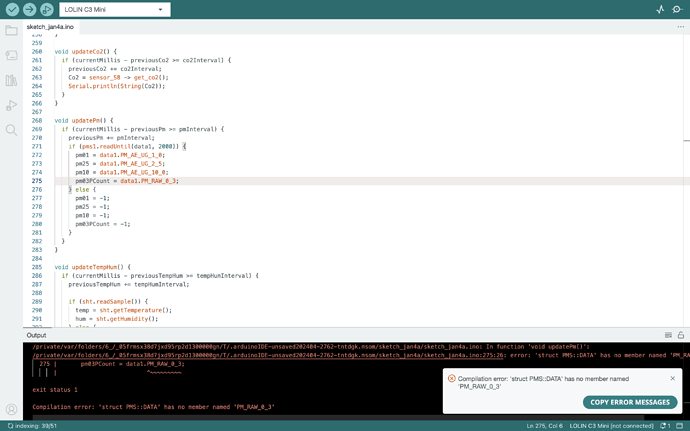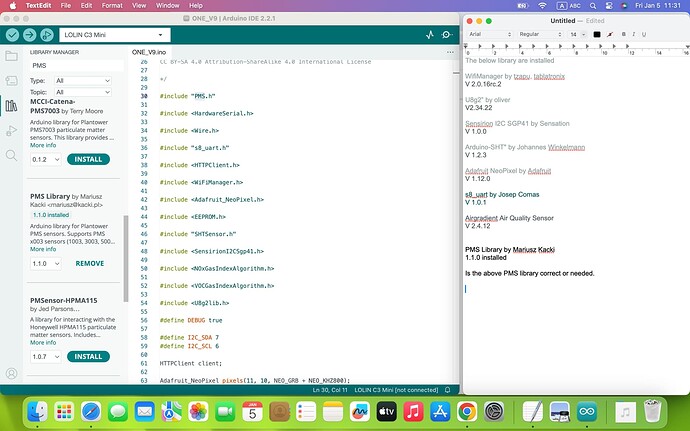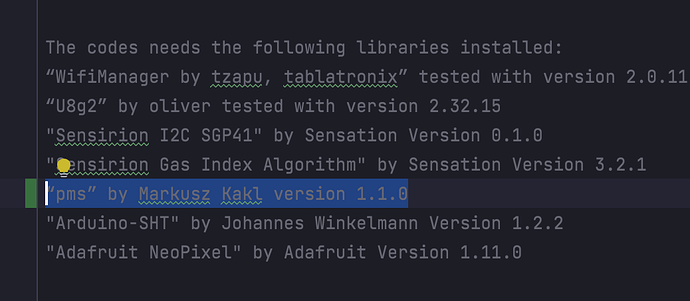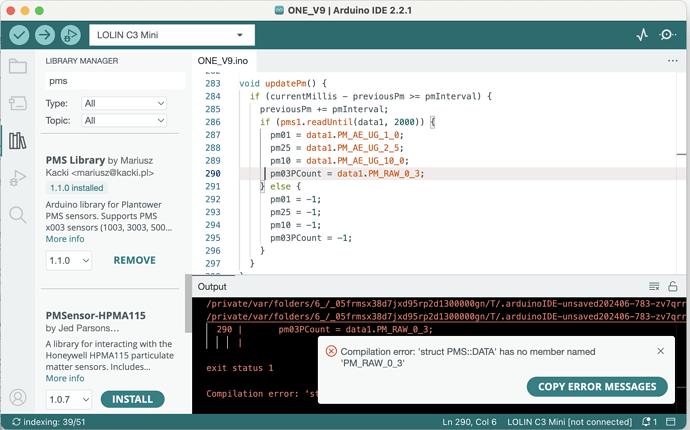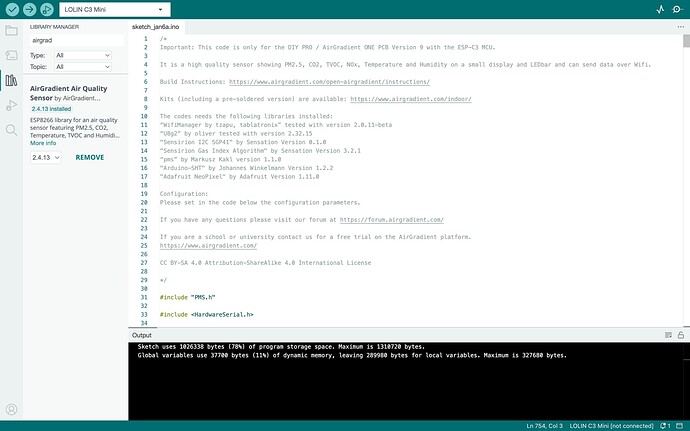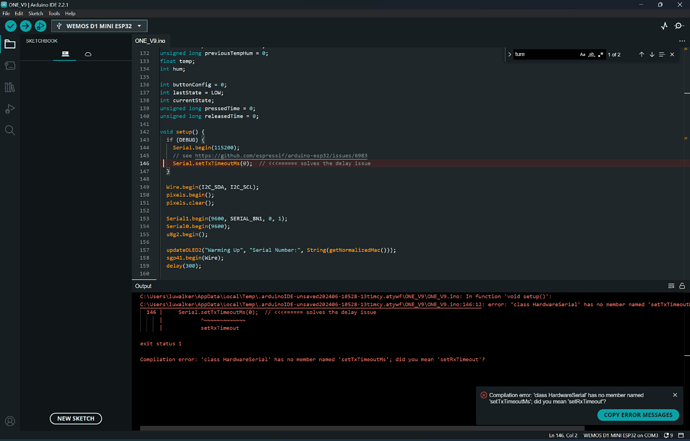Ok, I could reproduce the error. It seems I did some more patching on my local PMS library. To keep things simnple, I temporarily removed the PM03PCount from the example code. Now it compiles with the default PMS library.
I am also pushing the update to the Arduino library but it normally takes a day or two until it’s updated. In the meantime, you can use below script that compiles.
/*
Important: This code is only for the DIY PRO / AirGradient ONE PCB Version 9 with the ESP-C3 MCU.
It is a high quality sensor showing PM2.5, CO2, TVOC, NOx, Temperature and Humidity on a small display and LEDbar and can send data over Wifi.
Build Instructions: https://www.airgradient.com/open-airgradient/instructions/
Kits (including a pre-soldered version) are available: https://www.airgradient.com/indoor/
The codes needs the following libraries installed:
“WifiManager by tzapu, tablatronix” tested with version 2.0.11-beta
“U8g2” by oliver tested with version 2.32.15
"Sensirion I2C SGP41" by Sensation Version 0.1.0
"Sensirion Gas Index Algorithm" by Sensation Version 3.2.1
“pms” by Markusz Kakl version 1.1.0
"Arduino-SHT" by Johannes Winkelmann Version 1.2.2
"Adafruit NeoPixel" by Adafruit Version 1.11.0
Configuration:
Please set in the code below the configuration parameters.
If you have any questions please visit our forum at https://forum.airgradient.com/
If you are a school or university contact us for a free trial on the AirGradient platform.
https://www.airgradient.com/
CC BY-SA 4.0 Attribution-ShareAlike 4.0 International License
*/
#include "PMS.h"
#include <HardwareSerial.h>
#include <Wire.h>
#include "s8_uart.h"
#include <HTTPClient.h>
#include <WiFiManager.h>
#include <Adafruit_NeoPixel.h>
#include <EEPROM.h>
#include "SHTSensor.h"
#include <SensirionI2CSgp41.h>
#include <NOxGasIndexAlgorithm.h>
#include <VOCGasIndexAlgorithm.h>
#include <U8g2lib.h>
#define DEBUG true
#define I2C_SDA 7
#define I2C_SCL 6
HTTPClient client;
Adafruit_NeoPixel pixels(11, 10, NEO_GRB + NEO_KHZ800);
SensirionI2CSgp41 sgp41;
VOCGasIndexAlgorithm voc_algorithm;
NOxGasIndexAlgorithm nox_algorithm;
SHTSensor sht;
PMS pms1(Serial0);
PMS::DATA data1;
S8_UART * sensor_S8;
S8_sensor sensor;
// time in seconds needed for NOx conditioning
uint16_t conditioning_s = 10;
// for peristent saving and loading
int addr = 4;
byte value;
// Display bottom right
U8G2_SH1106_128X64_NONAME_F_HW_I2C u8g2(U8G2_R0, /* reset=*/ U8X8_PIN_NONE);
String APIROOT = "http://hw.airgradient.com/";
// set to true to switch from Celcius to Fahrenheit
boolean inF = false;
// PM2.5 in US AQI (default ug/m3)
boolean inUSAQI = false;
// Display Position
boolean displayTop = true;
// use RGB LED Bar
boolean useRGBledBar = true;
// set to true if you want to connect to wifi. You have 60 seconds to connect. Then it will go into an offline mode.
boolean connectWIFI = true;
int loopCount = 0;
unsigned long currentMillis = 0;
const int oledInterval = 5000;
unsigned long previousOled = 0;
const int sendToServerInterval = 10000;
unsigned long previoussendToServer = 0;
const int tvocInterval = 1000;
unsigned long previousTVOC = 0;
int TVOC = -1;
int NOX = -1;
const int co2Interval = 5000;
unsigned long previousCo2 = 0;
int Co2 = 0;
const int pmInterval = 5000;
unsigned long previousPm = 0;
int pm25 = -1;
int pm01 = -1;
int pm10 = -1;
//int pm03PCount = -1;
const int tempHumInterval = 5000;
unsigned long previousTempHum = 0;
float temp;
int hum;
int buttonConfig = 0;
int lastState = LOW;
int currentState;
unsigned long pressedTime = 0;
unsigned long releasedTime = 0;
void setup() {
if (DEBUG) {
Serial.begin(115200);
// see https://github.com/espressif/arduino-esp32/issues/6983
Serial.setTxTimeoutMs(0); // <<<====== solves the delay issue
}
Wire.begin(I2C_SDA, I2C_SCL);
pixels.begin();
pixels.clear();
Serial1.begin(9600, SERIAL_8N1, 0, 1);
Serial0.begin(9600);
u8g2.begin();
updateOLED2("Warming Up", "Serial Number:", String(getNormalizedMac()));
sgp41.begin(Wire);
delay(300);
sht.init(Wire);
//sht.setAccuracy(SHTSensor::SHT_ACCURACY_MEDIUM);
delay(300);
//init Watchdog
pinMode(2, OUTPUT);
digitalWrite(2, LOW);
sensor_S8 = new S8_UART(Serial1);
EEPROM.begin(512);
delay(500);
// push button
pinMode(9, INPUT_PULLUP);
buttonConfig = String(EEPROM.read(addr)).toInt();
if (buttonConfig > 7) buttonConfig = 0;
delay(400);
setConfig();
Serial.println("buttonConfig: " + String(buttonConfig));
updateOLED2("Press Button", "for LED test &", "offline mode");
delay(2000);
currentState = digitalRead(9);
if (currentState == LOW) {
ledTest();
return;
}
updateOLED2("Press Button", "Now for", "Config Menu");
delay(2000);
currentState = digitalRead(9);
if (currentState == LOW) {
updateOLED2("Entering", "Config Menu", "");
delay(3000);
lastState = HIGH;
setConfig();
inConf();
}
if (connectWIFI) connectToWifi();
if (WiFi.status() == WL_CONNECTED) {
sendPing();
Serial.println(F("WiFi connected!"));
Serial.println("IP address: ");
Serial.println(WiFi.localIP());
}
updateOLED2("Warming Up", "Serial Number:", String(getNormalizedMac()));
}
void loop() {
currentMillis = millis();
updateTVOC();
updateOLED();
updateCo2();
updatePm();
updateTempHum();
sendToServer();
}
void updateTVOC() {
uint16_t error;
char errorMessage[256];
uint16_t defaultRh = 0x8000;
uint16_t defaultT = 0x6666;
uint16_t srawVoc = 0;
uint16_t srawNox = 0;
uint16_t defaultCompenstaionRh = 0x8000; // in ticks as defined by SGP41
uint16_t defaultCompenstaionT = 0x6666; // in ticks as defined by SGP41
uint16_t compensationRh = 0; // in ticks as defined by SGP41
uint16_t compensationT = 0; // in ticks as defined by SGP41
delay(1000);
compensationT = static_cast < uint16_t > ((temp + 45) * 65535 / 175);
compensationRh = static_cast < uint16_t > (hum * 65535 / 100);
if (conditioning_s > 0) {
error = sgp41.executeConditioning(compensationRh, compensationT, srawVoc);
conditioning_s--;
} else {
error = sgp41.measureRawSignals(compensationRh, compensationT, srawVoc,
srawNox);
}
if (currentMillis - previousTVOC >= tvocInterval) {
previousTVOC += tvocInterval;
if (error) {
TVOC = -1;
NOX = -1;
Serial.println(String(TVOC));
} else {
TVOC = voc_algorithm.process(srawVoc);
NOX = nox_algorithm.process(srawNox);
Serial.println(String(TVOC));
}
}
}
void updateCo2() {
if (currentMillis - previousCo2 >= co2Interval) {
previousCo2 += co2Interval;
Co2 = sensor_S8 -> get_co2();
Serial.println(String(Co2));
}
}
void updatePm() {
if (currentMillis - previousPm >= pmInterval) {
previousPm += pmInterval;
if (pms1.readUntil(data1, 2000)) {
pm01 = data1.PM_AE_UG_1_0;
pm25 = data1.PM_AE_UG_2_5;
pm10 = data1.PM_AE_UG_10_0;
// pm03PCount = data1.PM_RAW_0_3;
} else {
pm01 = -1;
pm25 = -1;
pm10 = -1;
// pm03PCount = -1;
}
}
}
void updateTempHum() {
if (currentMillis - previousTempHum >= tempHumInterval) {
previousTempHum += tempHumInterval;
if (sht.readSample()) {
temp = sht.getTemperature();
hum = sht.getHumidity();
} else {
Serial.print("Error in readSample()\n");
temp = -10001;
hum = -10001;
}
}
}
void updateOLED() {
if (currentMillis - previousOled >= oledInterval) {
previousOled += oledInterval;
String ln3;
String ln1;
if (inUSAQI) {
ln1 = "AQI:" + String(PM_TO_AQI_US(pm25)) + " CO2:" + String(Co2);
} else {
ln1 = "PM:" + String(pm25) + " CO2:" + String(Co2);
}
String ln2 = "TVOC:" + String(TVOC) + " NOX:" + String(NOX);
if (inF) {
ln3 = "F:" + String((temp * 9 / 5) + 32) + " H:" + String(hum) + "%";
} else {
ln3 = "C:" + String(temp) + " H:" + String(hum) + "%";
}
//updateOLED2(ln1, ln2, ln3);
updateOLED3();
setRGBledCO2color(Co2);
}
}
void inConf() {
setConfig();
currentState = digitalRead(9);
if (currentState) {
Serial.println("currentState: high");
} else {
Serial.println("currentState: low");
}
if (lastState == HIGH && currentState == LOW) {
pressedTime = millis();
} else if (lastState == LOW && currentState == HIGH) {
releasedTime = millis();
long pressDuration = releasedTime - pressedTime;
if (pressDuration < 1000) {
buttonConfig = buttonConfig + 1;
if (buttonConfig > 7) buttonConfig = 0;
}
}
if (lastState == LOW && currentState == LOW) {
long passedDuration = millis() - pressedTime;
if (passedDuration > 4000) {
updateOLED2("Saved", "Release", "Button Now");
delay(1000);
updateOLED2("Rebooting", "in", "5 seconds");
delay(5000);
EEPROM.write(addr, char(buttonConfig));
EEPROM.commit();
delay(1000);
ESP.restart();
}
}
lastState = currentState;
delay(100);
inConf();
}
void setConfig() {
Serial.println("in setConfig");
if (buttonConfig == 0) {
u8g2.setDisplayRotation(U8G2_R0);
updateOLED2("T:C, PM:ug/m3", "LED Bar: on", "Long Press Saves");
inF = false;
inUSAQI = false;
useRGBledBar = true;
} else if (buttonConfig == 1) {
u8g2.setDisplayRotation(U8G2_R0);
updateOLED2("T:C, PM:US AQI", "LED Bar: on", "Long Press Saves");
inF = false;
inUSAQI = true;
useRGBledBar = true;
} else if (buttonConfig == 2) {
u8g2.setDisplayRotation(U8G2_R0);
updateOLED2("T:F PM:ug/m3", "LED Bar: on", "Long Press Saves");
inF = true;
inUSAQI = false;
useRGBledBar = true;
} else if (buttonConfig == 3) {
u8g2.setDisplayRotation(U8G2_R0);
updateOLED2("T:F PM:US AQI", "LED Bar: on", "Long Press Saves");
inF = true;
inUSAQI = true;
useRGBledBar = true;
} else if (buttonConfig == 4) {
updateOLED2("T:C, PM:ug/m3", "LED Bar: off", "Long Press Saves");
inF = false;
inUSAQI = false;
useRGBledBar = false;
} else if (buttonConfig == 5) {
u8g2.setDisplayRotation(U8G2_R0);
updateOLED2("T:C, PM:US AQI", "LED Bar: off", "Long Press Saves");
inF = false;
inUSAQI = true;
useRGBledBar = false;
} else if (buttonConfig == 6) {
u8g2.setDisplayRotation(U8G2_R0);
updateOLED2("T:F PM:ug/m3", "LED Bar: off", "Long Press Saves");
inF = true;
inUSAQI = false;
useRGBledBar = false;
} else if (buttonConfig == 7) {
u8g2.setDisplayRotation(U8G2_R0);
updateOLED2("T:F PM:US AQI", "LED Bar: off", "Long Press Saves");
inF = true;
inUSAQI = true;
useRGBledBar = false;
}
}
void sendPing() {
String payload = "{\"wifi\":" + String(WiFi.RSSI()) +
", \"boot\":" + loopCount +
"}";
}
void updateOLED2(String ln1, String ln2, String ln3) {
char buf[9];
u8g2.firstPage();
u8g2.firstPage();
do {
u8g2.setFont(u8g2_font_t0_16_tf);
u8g2.drawStr(1, 10, String(ln1).c_str());
u8g2.drawStr(1, 30, String(ln2).c_str());
u8g2.drawStr(1, 50, String(ln3).c_str());
} while (u8g2.nextPage());
}
void updateOLED3() {
char buf[9];
u8g2.firstPage();
u8g2.firstPage();
do {
u8g2.setFont(u8g2_font_t0_16_tf);
if (inF) {
if (temp > -10001) {
float tempF = (temp * 9 / 5) + 32;
sprintf(buf, "%.1f°F", tempF);
} else {
sprintf(buf, "-°F");
}
u8g2.drawUTF8(1, 10, buf);
} else {
if (temp > -10001) {
sprintf(buf, "%.1f°C", temp);
} else {
sprintf(buf, "-°C");
}
u8g2.drawUTF8(1, 10, buf);
}
if (hum >= 0) {
sprintf(buf, "%d%%", hum);
} else {
sprintf(buf, " -%%");
}
if (hum > 99) {
u8g2.drawStr(97, 10, buf);
} else {
u8g2.drawStr(105, 10, buf);
// there might also be single digits, not considered, sprintf might actually support a leading space
}
u8g2.drawLine(1, 13, 128, 13);
u8g2.setFont(u8g2_font_t0_12_tf);
u8g2.drawUTF8(1, 27, "CO2");
u8g2.setFont(u8g2_font_t0_22b_tf);
if (Co2 > 0) {
sprintf(buf, "%d", Co2);
} else {
sprintf(buf, "%s", "-");
}
u8g2.drawStr(1, 48, buf);
u8g2.setFont(u8g2_font_t0_12_tf);
u8g2.drawStr(1, 61, "ppm");
u8g2.drawLine(45, 15, 45, 64);
u8g2.setFont(u8g2_font_t0_12_tf);
u8g2.drawStr(48, 27, "PM2.5");
u8g2.setFont(u8g2_font_t0_22b_tf);
if (inUSAQI) {
if (pm25 >= 0) {
sprintf(buf, "%d", PM_TO_AQI_US(pm25));
} else {
sprintf(buf, "%s", "-");
}
u8g2.drawStr(48, 48, buf);
u8g2.setFont(u8g2_font_t0_12_tf);
u8g2.drawUTF8(48, 61, "AQI");
} else {
if (pm25 >= 0) {
sprintf(buf, "%d", pm25);
} else {
sprintf(buf, "%s", "-");
}
u8g2.drawStr(48, 48, buf);
u8g2.setFont(u8g2_font_t0_12_tf);
u8g2.drawUTF8(48, 61, "ug/m³");
}
u8g2.drawLine(82, 15, 82, 64);
u8g2.setFont(u8g2_font_t0_12_tf);
u8g2.drawStr(85, 27, "TVOC:");
if (TVOC >= 0) {
sprintf(buf, "%d", TVOC);
} else {
sprintf(buf, "%s", "-");
}
u8g2.drawStr(85, 39, buf);
u8g2.drawStr(85, 53, "NOx:");
if (NOX >= 0) {
sprintf(buf, "%d", NOX);
} else {
sprintf(buf, "%s", "-");
}
u8g2.drawStr(85, 63, buf);
} while (u8g2.nextPage());
}
void sendToServer() {
if (currentMillis - previoussendToServer >= sendToServerInterval) {
previoussendToServer += sendToServerInterval;
String payload = "{\"wifi\":" + String(WiFi.RSSI()) +
(Co2 < 0 ? "" : ", \"rco2\":" + String(Co2)) +
(pm01 < 0 ? "" : ", \"pm01\":" + String(pm01)) +
(pm25 < 0 ? "" : ", \"pm02\":" + String(pm25)) +
(pm10 < 0 ? "" : ", \"pm10\":" + String(pm10)) +
// (pm03PCount < 0 ? "" : ", \"pm003_count\":" + String(pm03PCount)) +
(TVOC < 0 ? "" : ", \"tvoc_index\":" + String(TVOC)) +
(NOX < 0 ? "" : ", \"nox_index\":" + String(NOX)) +
", \"atmp\":" + String(temp) +
(hum < 0 ? "" : ", \"rhum\":" + String(hum)) +
", \"boot\":" + loopCount +
"}";
if (WiFi.status() == WL_CONNECTED) {
Serial.println(payload);
String POSTURL = APIROOT + "sensors/airgradient:" + String(getNormalizedMac()) + "/measures";
Serial.println(POSTURL);
WiFiClient client;
HTTPClient http;
http.begin(client, POSTURL);
http.addHeader("content-type", "application/json");
int httpCode = http.POST(payload);
String response = http.getString();
Serial.println(httpCode);
Serial.println(response);
http.end();
resetWatchdog();
loopCount++;
} else {
Serial.println("WiFi Disconnected");
}
}
}
void countdown(int from) {
debug("\n");
while (from > 0) {
debug(String(from--));
debug(" ");
delay(1000);
}
debug("\n");
}
void resetWatchdog() {
Serial.println("Watchdog reset");
digitalWrite(2, HIGH);
delay(20);
digitalWrite(2, LOW);
}
// Wifi Manager
void connectToWifi() {
WiFiManager wifiManager;
//WiFi.disconnect(); //to delete previous saved hotspot
String HOTSPOT = "AG-" + String(getNormalizedMac());
updateOLED2("180s to connect", "to Wifi Hotspot", HOTSPOT);
wifiManager.setTimeout(180);
if (!wifiManager.autoConnect((const char * ) HOTSPOT.c_str())) {
Serial.println("failed to connect and hit timeout");
delay(6000);
}
}
void debug(String msg) {
if (DEBUG)
Serial.print(msg);
}
void debug(int msg) {
if (DEBUG)
Serial.print(msg);
}
void debugln(String msg) {
if (DEBUG)
Serial.println(msg);
}
void debugln(int msg) {
if (DEBUG)
Serial.println(msg);
}
String getNormalizedMac() {
String mac = WiFi.macAddress();
mac.replace(":", "");
mac.toLowerCase();
return mac;
}
void setRGBledCO2color(int co2Value) {
if (co2Value >= 300 && co2Value < 800) setRGBledColor('g');
if (co2Value >= 800 && co2Value < 1000) setRGBledColor('y');
if (co2Value >= 1000 && co2Value < 1500) setRGBledColor('o');
if (co2Value >= 1500 && co2Value < 2000) setRGBledColor('r');
if (co2Value >= 2000 && co2Value < 3000) setRGBledColor('p');
if (co2Value >= 3000 && co2Value < 10000) setRGBledColor('z');
}
void setRGBledColor(char color) {
if (useRGBledBar) {
//pixels.clear();
switch (color) {
case 'g':
for (int i = 0; i < 11; i++) {
pixels.setPixelColor(i, pixels.Color(0, 255, 0));
delay(30);
pixels.show();
}
break;
case 'y':
for (int i = 0; i < 11; i++) {
pixels.setPixelColor(i, pixels.Color(255, 255, 0));
delay(30);
pixels.show();
}
break;
case 'o':
for (int i = 0; i < 11; i++) {
pixels.setPixelColor(i, pixels.Color(255, 128, 0));
delay(30);
pixels.show();
}
break;
case 'r':
for (int i = 0; i < 11; i++) {
pixels.setPixelColor(i, pixels.Color(255, 0, 0));
delay(30);
pixels.show();
}
break;
case 'b':
for (int i = 0; i < 11; i++) {
pixels.setPixelColor(i, pixels.Color(0, 0, 255));
delay(30);
pixels.show();
}
break;
case 'w':
for (int i = 0; i < 11; i++) {
pixels.setPixelColor(i, pixels.Color(255, 255, 255));
delay(30);
pixels.show();
}
break;
case 'p':
for (int i = 0; i < 11; i++) {
pixels.setPixelColor(i, pixels.Color(153, 0, 153));
delay(30);
pixels.show();
}
break;
case 'z':
for (int i = 0; i < 11; i++) {
pixels.setPixelColor(i, pixels.Color(102, 0, 0));
delay(30);
pixels.show();
}
break;
case 'n':
for (int i = 0; i < 11; i++) {
pixels.setPixelColor(i, pixels.Color(0, 0, 0));
delay(30);
pixels.show();
}
break;
default:
// if nothing else matches, do the default
// default is optional
break;
}
}
}
void ledTest() {
updateOLED2("LED Test", "running", ".....");
for (int i = 0; i < 11; i++) {
pixels.setPixelColor(i, pixels.Color(255, 0, 0));
delay(30);
pixels.show();
}
delay(500);
for (int i = 0; i < 11; i++) {
pixels.setPixelColor(i, pixels.Color(0, 255, 0));
delay(30);
pixels.show();
}
delay(500);
for (int i = 0; i < 11; i++) {
pixels.setPixelColor(i, pixels.Color(0, 0, 255));
delay(30);
pixels.show();
}
delay(500);
for (int i = 0; i < 11; i++) {
pixels.setPixelColor(i, pixels.Color(255, 255, 255));
delay(30);
pixels.show();
}
delay(500);
for (int i = 0; i < 11; i++) {
pixels.setPixelColor(i, pixels.Color(0, 0, 0));
delay(30);
pixels.show();
}
delay(500);
}
// Calculate PM2.5 US AQI
int PM_TO_AQI_US(int pm02) {
if (pm02 <= 12.0) return ((50 - 0) / (12.0 - .0) * (pm02 - .0) + 0);
else if (pm02 <= 35.4) return ((100 - 50) / (35.4 - 12.0) * (pm02 - 12.0) + 50);
else if (pm02 <= 55.4) return ((150 - 100) / (55.4 - 35.4) * (pm02 - 35.4) + 100);
else if (pm02 <= 150.4) return ((200 - 150) / (150.4 - 55.4) * (pm02 - 55.4) + 150);
else if (pm02 <= 250.4) return ((300 - 200) / (250.4 - 150.4) * (pm02 - 150.4) + 200);
else if (pm02 <= 350.4) return ((400 - 300) / (350.4 - 250.4) * (pm02 - 250.4) + 300);
else if (pm02 <= 500.4) return ((500 - 400) / (500.4 - 350.4) * (pm02 - 350.4) + 400);
else return 500;
};
